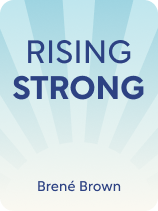

This article is an excerpt from the Shortform book guide to "Rising Strong" by Brené Brown. Shortform has the world's best summaries and analyses of books you should be reading.
Like this article? Sign up for a free trial here.
Do you sometimes lash out or get angry at small things? How can emotional setbacks help you grow?
In Rising Strong, Brené Brown says that the key to fulfillment is pursuing wholeheartedness, a way of life that fosters self-worth. Yet emotional setbacks such as heartbreak and loss can prevent you from being brave and cultivating meaningful relationships.
Read below for a brief overview of Rising Strong.
Rising Strong by Brené Brown
Living wholeheartedly requires you to embrace your authentic self and show that self to others. However, being open and authentic with others makes you vulnerable. You may face painful experiences like rejection, loss, and heartbreak. If left unaddressed, these experiences cause emotional setbacks that keep you from living wholeheartedly. In Rising Strong, Brené Brown explains that to live a fulfilling life, you must go through a recovery process whenever you experience emotional setbacks so you can again embrace your authentic self, be open with others, and cultivate wholeheartedness.
Brown is the author of numerous bestsellers, including The Gifts of Imperfection, Daring Greatly, Dare to Lead, I Thought It Was Just Me (but it isn’t), and Atlas of the Heart. She’s also a lecturer and a research professor who studies courage, vulnerability, empathy, and shame. Further, she hosts two podcasts, Unlocking Us and Dare to Lead, and is well-known for her 2010 TEDx talk on the power of vulnerability.
Part 1: The Importance of the Recovery Process
Brown explains that emotional setbacks such as disappointment, grief, heartbreak, and failure are valuable, natural parts of life. Despite being painful, they’re an opportunity to develop emotional resilience, deepen your understanding of yourself and others, and grow. In turn, these benefits lead to a more stable state of wholeheartedness—but to reap them, you must confront your pain and undertake the process of recovery.
Brown says many people avoid confronting the recovery process and instead try to push through or ignore their pain. They do so because confronting strong emotions can be scary and painful. However, avoidance causes them to first repress their emotions, and then release them (often subconsciously) through unhealthy behaviors that harm themselves and others.
There are four main consequences to repressing emotions instead of actively recovering from setbacks.
Consequence #1: Emotional Triggers
According to Brown, when something happens that causes us pain, and we repress rather than confront that pain, our brains form a trigger: Whenever a similar situation happens in the future that reminds us of the original experience, our repressed pain is triggered. This phenomenon often causes us to overreact to situations and can damage our well-being and relationships.
For example, imagine that you felt unimportant as a teenager because your parents never attended important events in your life like sports games and school concerts. You never confront that emotional pain, so as an adult, you get irrationally upset and lash out when people don’t give you the support you desire. So, you blow up at your friend because, while they usually attend your choir concerts, they can’t make it on one occasion.
Consequence #2: Addiction
Brown explains that many people rely on substances and intense experiences (like thrill-seeking) to avoid or numb their pain with a temporary happiness boost. However, these substances and experiences don’t resolve the pain, so when the happiness boost wears off, they crave another quick fix. This is how addictions form.
For example, you might start eating junk food to numb the pain of a breakup. While the junk food doesn’t get rid of the pain, it temporarily distracts you from your emotions—so, you form a habit of eating junk food whenever you feel upset. Now, you’re addicted to junk food as a self-soothing tactic—even after the breakup pain passes.
Consequence #3: Burnout
When we continually repress and ignore painful emotions, the accumulated hurt eventually causes our bodies to stop functioning properly. Brown explains that we become overwhelmed with anxiety and depression and can’t perform basic functions like eating, sleeping, and working.
For example, imagine you’re turned down for your dream job, your partner breaks up with you, and your friends are growing distant. These situations have all made you feel disappointed and unworthy, but rather than facing your feelings and identifying how you can handle them, you pretend you don’t care. The bottled up emotions accumulate, causing your self-esteem to drop and depression to set in—you start to shut down. You stop caring about things that used to be important to you, like advancing your career, and you feel too dejected to perform basic tasks like eating healthy and socializing.
Consequence #4: Blame and Anger
Brown explains that avoiding pain can lead to blame and anger due to the influence of our egos. The ego constantly urges us to be stronger and better than others, and it encourages the belief that pain is a form of weakness that makes us “lesser.” To avoid acknowledging our pain (and therefore our apparent weakness), the ego encourages us to instead release our emotions by getting angry and blaming others.
For example, your spouse decided not to attend an award ceremony that was important to you because they weren’t feeling well. This made you feel unimportant. Instead of admitting that their actions hurt you, you give your spouse the cold shoulder for the rest of the week and start petty fights to take out your anger on them.
Part 2: The Recovery Process
Based on her research, Brown argues that people who recover from emotional setbacks go through three stages. In the following sections, we’ll explore these stages and Brown’s tips for navigating them.
Stage #1: Confront Your Emotions
Brown argues that the first stage of the recovery process is to recognize when you’re having an emotional setback and explore your reaction. With practice, you’ll be able to recognize a setback as it happens; however, at first, you may need to reflect on the experience retrospectively.
To recognize the start of an emotional setback, Brown says you must first notice negative sensations in your body and your mind. When we experience painful situations, our bodies and minds usually react first. For example, you might feel physical sensations like pain in your chest; or, mental sensations like impulsive thoughts or the inability to control your thoughts. When you notice these sensations, acknowledge that you’re having an emotionally painful reaction to something.
For example, when you got the message that your spouse wouldn’t be at your award ceremony, you might have experienced a sinking feeling in your stomach or the urge to hit something. When you feel these sensations begin, acknowledge that something has hurt you and you’re having an emotional setback.
Next, Brown advises you to explore your reaction. What are you feeling? What caused this reaction? For example, the bodily sensations you felt after receiving the message from your spouse might indicate that you’re feeling angry and disappointed. Upon reflecting, you might realize you’re angry because your spouse’s lack of attendance makes you feel unimportant.
Stage #2: Explore What Happened
Brown explains that the second stage of the recovery process is exploring your narrative about the situation and identifying how that narrative might differ from reality. When we experience something painful, our brains try to determine what happened and why in an attempt to avoid ambiguity. However, we don’t usually have all the important information about the situation—such as someone’s true feelings, intentions, or reasons. Therefore, we tend to assume the worst about what happened and why based on our negative past experiences. This creates an inaccurate narrative.
Relying on negative, inaccurate narratives often fosters negative feelings about ourselves and others. This keeps us from embracing our authentic selves, being open with others, and recovering wholeheartedness. For example, we might assume that someone’s intent was to hurt us or that they acted in a certain way because we weren’t good enough.
On the other hand, when we confront our narrative and its potential inaccuracies, we’re able to identify and combat our negative assumptions. This gives us a more balanced perspective of the situation and those involved in it so we’re better equipped to recover from setbacks and re-embrace wholeheartedness.
Further, learning to overcome these assumption reactions will boost your resilience—your ability to avoid or quickly recover from emotional setbacks in the future. This is because the more you practice deconstructing your inaccurate narratives, the easier it will get and the better you’ll become at preventing yourself from creating them in the first place.
Stage #3: Change Your Thoughts and Behaviors to Build Resilience
Brown explains that the final stage of the recovery process is to identify ways in which you can alter your thoughts and behaviors to avoid emotional setbacks in the future.
To complete this stage, consider: What new, more positive narratives do you need to tell yourself to avoid making negative assumptions about yourself or others? What emotional wounds and beliefs do you need to overcome to improve your relationships, strengthen your self-worth, and create a happier, more fulfilling life for yourself? Every time you experience a new emotional setback and move through the recovery process, ask yourself these questions and determine which wounds to heal next.
To move forward and build resilience, you must identify ways to lessen the control that your fear has over your thoughts and behaviors. You might do this by catching yourself when you assume ill-intent from someone and trying to see the situation from their perspective. Further, you could work on forming more realistic expectations of others. It may not be realistic or fair to expect your spouse to attend your ceremony if they’re sick—you need to consider their needs, not just your own.

———End of Preview———
Like what you just read? Read the rest of the world's best book summary and analysis of Brené Brown's "Rising Strong" at Shortform.
Here's what you'll find in our full Rising Strong summary:
- How to rebuild wholeheartedness after setbacks and recover emotionally
- Why you shouldn't try to push through or ignore emotional pain
- Brené Brown's three-stage recovery process to cultivate resilience






